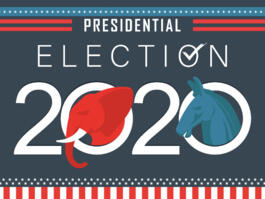Most Oppose ‘Packing’ Supreme Court But Favor Term Limits for Justices
Angered by President Trump’s nomination of a new U.S. Supreme Court justice just weeks before Election Day, several prominent Democrats have suggested adding more members to the high court or imposing term limits on the justices if their party regains control of the Senate. Most voters continue to favor term limits for the Supreme Court but oppose packing it with more members.
A new Rasmussen Reports national telephone and online survey finds that 52% of Likely U.S. Voters believe Supreme Court justices should be subject to term limits. Thirty-six percent (36%) disagree, up from 30% the first time we asked these questions in March 2019. Thirteen percent (13%) are not sure. (To see survey question wording, click here.)
Only 32% favor increasing the number of justices on the high court, but that’s up from 27% in last year’s survey. Fifty-three percent (53%) are opposed. Fourteen percent (14%) are undecided.
Sixty-four percent (64%) of Democrats want term limits for Supreme Court justices, compared to 39% of Republicans and 49% of voters not affiliated with either major party. Democrats (45%) are also bigger fans than GOP voters (21%) and unaffiliateds (29%) of packing the court with more members.
The U.S. Supreme Court historically has a chief justice and eight associate justices, all appointed to lifetime terms. The vast majority opt for retirement, though, and unlike Ruth Bader Ginsburg don’t die while in office. The last major attempt to change the makeup of the court was in the late 1930s when President Franklin D. Roosevelt, angry at rulings stopping portions of his New Deal, unsuccessfully attempted to “pack the court” with additional pro-Roosevelt members.
(Want a free daily e-mail update? If it's in the news, it's in our polls). Rasmussen Reports updates are also available on Twitter or Facebook.
The survey of 1,000 Likely Voters was conducted September 27, 2020 by Rasmussen Reports. The margin of sampling error is +/- 3 percentage points with a 95% level of confidence. Field work for all Rasmussen Reports surveys is conducted by Pulse Opinion Research, LLC. See methodology.
Voters aren’t convinced that Trump’s latest nominee, federal Judge Amy Coney Barrett, should sit on the U.S. Supreme Court, but a sizable majority expects her to be confirmed by the Senate to fill Ginsburg’s seat.
Women and middle-aged voters are bigger fans of term limits for the justices than men, those under 40 and seniors are. All are in general agreement, however, that they don’t want to pack the court.
Blacks are much bigger supporters of both moves than whites and other minority voters.
Liberals are far more likely than conservatives to want to term-limit the justices and add members to the high court.
Among voters who favor term limits, a plurality (49%) also wants to add more justices.
As recently as early July, 41% of all voters gave the Supreme Court positive marks for its job performance, down only slightly from all-time highs of 43% in 2018 and 2019. Positives for the court ran in the low to mid-30s for several years prior to that.
Sixty-five percent (65%) rated the Senate’s handling of the nomination of Judge Brett Kavanaugh, Trump’s previous choice for the high court, as poor. Those hearings included last-minute, unsubstantiated charges of sexual violence and harassment against the nominee by Democratic senators.
Additional information from this survey and a full demographic breakdown are available to Platinum Members only.
Please sign up for the Rasmussen Reports daily e-mail update (it's free) or follow us on Facebook. Let us keep you up to date with the latest public opinion news.
The survey of 1,000 Likely Voters was conducted September 27, 2020 by Rasmussen Reports. The margin of sampling error is +/- 3 percentage points with a 95% level of confidence. Field work for all Rasmussen Reports surveys is conducted by Pulse Opinion Research, LLC. See methodology.
Rasmussen Reports is a media company specializing in the collection, publication and distribution of public opinion information.
We conduct public opinion polls on a variety of topics to inform our audience on events in the news and other topics of interest. To ensure editorial control and independence, we pay for the polls ourselves and generate revenue through the sale of subscriptions, sponsorships, and advertising. Nightly polling on politics, business and lifestyle topics provides the content to update the Rasmussen Reports web site many times each day. If it's in the news, it's in our polls. Additionally, the data drives a daily update newsletter and various media outlets across the country.
Some information, including the Rasmussen Reports daily Presidential Tracking Poll and commentaries are available for free to the general public. Subscriptions are available for $4.95 a month or 34.95 a year that provide subscribers with exclusive access to more than 20 stories per week on upcoming elections, consumer confidence, and issues that affect us all. For those who are really into the numbers, Platinum Members can review demographic crosstabs and a full history of our data.
To learn more about our methodology, click here.




